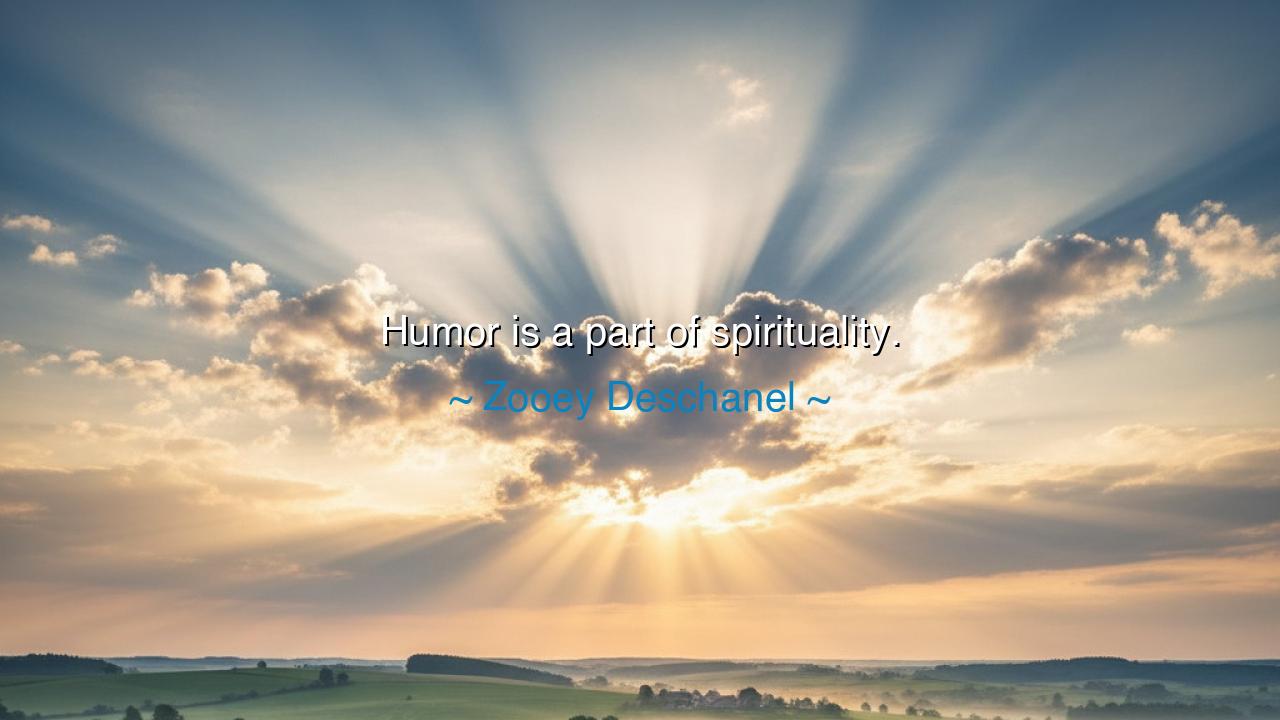
Humor is a part of spirituality.






In the words of Zooey Deschanel, “Humor is a part of spirituality.”
Though brief, this statement carries the weight of centuries, for within it lies the recognition that laughter is not mere entertainment, but a sacred act — a release of the soul, a quiet form of prayer. Deschanel, known for her gentleness and warmth, here gives voice to an ancient truth: that spirituality is not only found in solemn temples or in whispered prayers, but also in the joy that wells up when the heart remembers how to be light. For to laugh sincerely is to confess one’s humanity, and to confess one’s humanity is to draw closer to the divine.
When she says that humor is part of spirituality, Deschanel speaks to the unity of the sacred and the joyful. Too often the world divides them — reverence from laughter, holiness from mirth — as though the heavens themselves could not smile. But the ancients knew better. In the wisdom of the East, it was said that laughter is the sound of enlightenment, the moment when the soul sees through illusion and beholds the beautiful absurdity of existence. In the West, too, the mystics and poets saw joy as divine. Francis of Assisi, who loved every creature as kin, laughed as easily as he prayed. His faith was not bound by fear, but lifted by delight. He knew that to laugh was to recognize creation’s wonder — that humor, in its truest form, is the soul’s way of bowing before mystery.
The origin of this truth reaches far back, to the dawn of philosophy itself. The great thinkers of Greece — from Socrates to Aristophanes — knew that laughter and wisdom were siblings, born from the same spirit of humility. For laughter breaks pride, and pride is the wall that separates man from spirit. When Socrates, the wisest of men, pretended ignorance and made others laugh with his simple questions, he was not mocking knowledge — he was humbling it. Through irony, he led others to see the limits of their certainty, and in that humility, they touched truth. This is the heart of spiritual humor: not ridicule, but revelation — the light that enters when we stop taking ourselves too seriously.
True humor, as Deschanel implies, is not cruelty, but compassion. It is born not from the desire to wound, but from the wisdom to forgive. It softens the heart and disarms the ego. In laughter, the boundaries between self and other dissolve; we become, if only for a breath, united in shared joy. Even the gods of myth laughed — Buddha, serene beneath the Bodhi tree, was said to smile at the folly of human striving; Zeus himself laughed with the other immortals at the wildness of mortal life. Their laughter was not mockery, but understanding — the eternal amusement of those who see the tapestry of existence in full, and know that even chaos has its harmony.
Consider the story of the Dalai Lama, who, when asked how he could remain joyful despite exile and loss, simply smiled and said, “I practice laughter.” He did not mean that he ignored suffering, but that he refused to be consumed by it. His laughter was not denial — it was transcendence. Through humor, he transformed pain into compassion, and fear into freedom. Such is the power Deschanel speaks of: humor as spiritual alchemy, turning the heaviness of existence into light.
And yet, there is a gentle warning hidden within this wisdom. Not all laughter is sacred. There is laughter that divides, that ridicules, that hides insecurity beneath cruelty. Such laughter is hollow, a mockery of spirit. The humor Deschanel calls part of spirituality is of a higher order — it is the laughter of the awakened heart, the joy that arises when one sees both the tragedy and the beauty of life, and loves them equally. It is laughter rooted in gratitude, in the recognition that even imperfection can be divine.
Let this then be the teaching passed down: Do not separate joy from holiness. Seek laughter not as escape, but as enlightenment. When you laugh at yourself, you free yourself from the chains of ego; when you make others laugh with kindness, you lift them toward peace. Cultivate a humor that heals — humor that shines, that blesses, that forgives. Remember that laughter is not the enemy of prayer, but its echo. For when you laugh with love, you pray without words.
And so, dear listener, hold fast to Zooey Deschanel’s truth: “Humor is a part of spirituality.” In your laughter, find reverence; in your reverence, find joy. Let your spirit be both solemn and silly, wise and warm. For the divine does not dwell only in silence and stillness, but also in the rising sound of laughter — that most human, most holy of songs, which says to the universe: I understand, and I am still glad to be alive.






AAdministratorAdministrator
Welcome, honored guests. Please leave a comment, we will respond soon